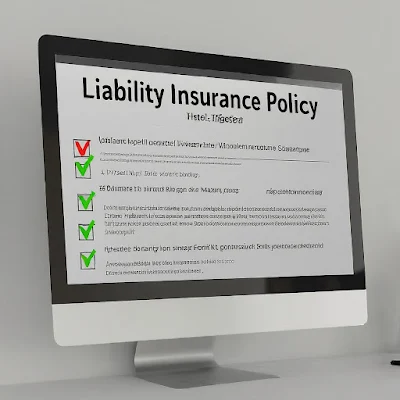Hey there! Let’s talk about something crucial for every business owner, freelancer, or professional: liability insurance.
 |
| There are several types of liability coverage tailored to different needs |
It might not sound as exciting as launching a new product or service, but trust me, it's essential for your financial security and peace of mind.
What is It?
Simply put, liability insurance is a type of insurance that provides coverage for claims against you or your business for damages or injuries caused to others. It helps protect your assets and covers legal costs in case someone sues you.
Types of Liability Cover
There are several types of liability coverage tailored to different needs:
General Liability Insurance
This type of insurance covers common risks such as property damage, bodily injury, and advertising injury claims. It's a fundamental coverage for most businesses.
Professional Liability Insurance
Also known as errors and omissions insurance, professional liability insurance protects professionals from claims of negligence or inadequate work.
Product Liability Insurance
Product liability insurance is crucial for businesses that manufacture or sell products. It covers legal expenses if a product causes harm or injury to a consumer.
Importance of Liability Insurance
It has two main advantages among others, these are:
Protection Against Lawsuits
In today's litigious society, lawsuits are becoming increasingly common. Liability coverage provides a shield against legal actions that could otherwise bankrupt your business.
Financial Security
Without liability coverage, you could be personally responsible for paying damages or legal fees out of pocket. This could jeopardize your savings, assets, and even your future earnings.
Who Needs It?
Simply put, anyone engaged in business activities can benefit from liability cover.
Whether you're a freelancer, contractor, small business owner, or large corporation, this is a must-have.
Factors to Consider When Choosing Liability Insurance
Here are the factors to consider:
Nature of Business
The type and amount of liability insurance you need depend on the nature of your business.
A construction company may require higher coverage limits than a graphic design studio.
Coverage Limits
It's crucial to assess your potential liabilities and choose coverage limits that adequately protect your assets.
However, be wary of underinsuring or overinsuring, as both can have financial consequences.
Premium Costs
While cost shouldn't be the sole determining factor, it's essential to find a balance between adequate coverage and affordable premiums.
Compare quotes from different insurers to find the best value for your money.
How to Obtain Liability Insurance
These are the guidelines:
Researching Insurance Providers
Start by researching reputable providers that offer liability coverage tailored to your needs.
Look for companies with a strong financial standing and positive customer reviews.
Requesting Quotes
Once you've narrowed down your options, request quotes from multiple insurers to compare coverage options and premiums.
Don't forget to inquire about any discounts or special offers available.
Reviewing Policy Terms
Before committing to a policy, carefully review the terms and conditions, including coverage limits, exclusions, and deductible amounts. If anything is unclear, don't hesitate to ask your insurer for clarification.
Common Misconceptions
These are:
"I'm Not at Risk for Lawsuits"
No matter how cautious you are, accidents can happen, and anyone can be sued. Liability insurance provides a safety net, even for the most diligent business owners.
"Liability Insurance is Expensive"
While premiums vary depending on factors such as coverage limits and industry risk, the cost of liability insurance is generally affordable compared to the potential financial consequences of being uninsured.
Tips for Managing Liability Risks
Implementing Safety Measures
Prevention is always better than cure. Take proactive steps to minimize risks in your business operations, such as implementing safety protocols and providing adequate training to employees.
Proper Documentation
Keep detailed records of your business activities, contracts, and communications with clients or customers. In the event of a lawsuit, thorough documentation can be invaluable in your defense.
In conclusion, it is not just another business expense – it's a vital safeguard against unforeseen risks and legal liabilities.
By understanding your coverage needs and choosing the right policy, you can protect your assets and focus on growing your business with confidence.

Post a Comment (0)